Trigger Warning: The article discusses fatphobia and fat shaming.
“I was being weighed in school during the physical education class. We were all queued up so everybody could easily figure out what the weight of the person before them was and people would often discuss after finding their weight. I weighed higher than the rest of the girls and was obese as per the BMI for my age and height, I felt a wave of shame take over my body,” says A, a 26-year-old cisgender woman.
The body’s shape is determined by society and each social group on the basis of their history of beauty standards defines what the ideal body should look like. For example, in the 60s and 70s India, Bollywood decided that softer bodies with curves and flabby stomachs were the epitome of beauty and sensuality. Similarly, broader arms and shoulders were a sign of strength, fertility and desirability amongst African American women.
The body’s shape is determined by society and each social group on the basis of their history of beauty standards defines what the ideal body should look like. For example, in the 60s and 70s India, Bollywood decided that softer bodies with curves and flabby stomachs were the epitome of beauty and sensuality. Similarly, broader arms and shoulders were a sign of strength, fertility and desirability amongst African American women. Thus, the idea of a desirable body is heavily influenced by social mores and primarily popular culture.
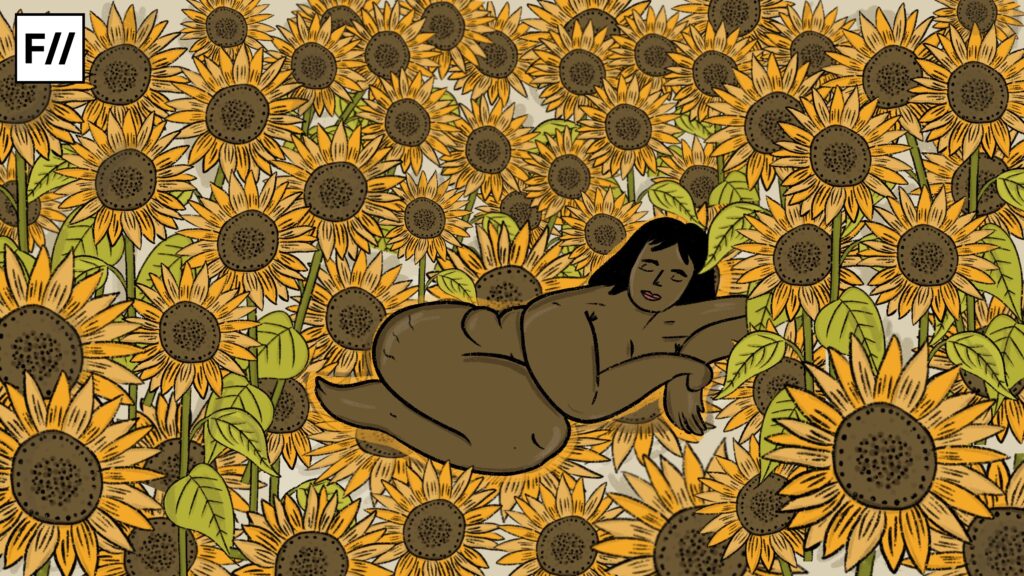
It is very recently (in the last 30 years) that a certain body type has been hailed and glorified as the ‘perfect’ body size and any body which goes against that image is considered ‘aberrant’. Our society is laced with fatphobia, which is the morbid rejection of being fat and getting fat. It amounts to discrimination against a person on the sheer basis of their fat body.
Society attaches the notion of being out of control, lazy and careless with a fat body, completely ignoring the other socio-cultural aspects that contribute to the shape of someone’s body. Until the beginning of the 20th century, the standard of beauty for a woman was a fuller body as it was indicative of fertility, health, wealth and emotional well-being. However, from the 1900s, the size of a woman’s body became a social, cultural and medical issue and now is measured from the point of the internet’s new aesthetic.
Most gynaecologists and dermatologists always point out my fat body and that makes me feel horrible. I know I am fat. I did not need someone to remind me that and I also did not need that as a one-stop diagnosis for all the issues I was facing. There was more to the issues I was dealing with besides fatness and I would like a diagnosis for that instead.
O, a 23-year-old cisgender woman
“Most gynaecologists and dermatologists always point out my fat body and that makes me feel horrible. I know I am fat. I did not need someone to remind me that and I also did not need that as a one-stop diagnosis for all the issues I was facing. There was more to the issues I was dealing with besides fatness and I would like a diagnosis for that instead,” says O, a 23-year-old cisgender woman.
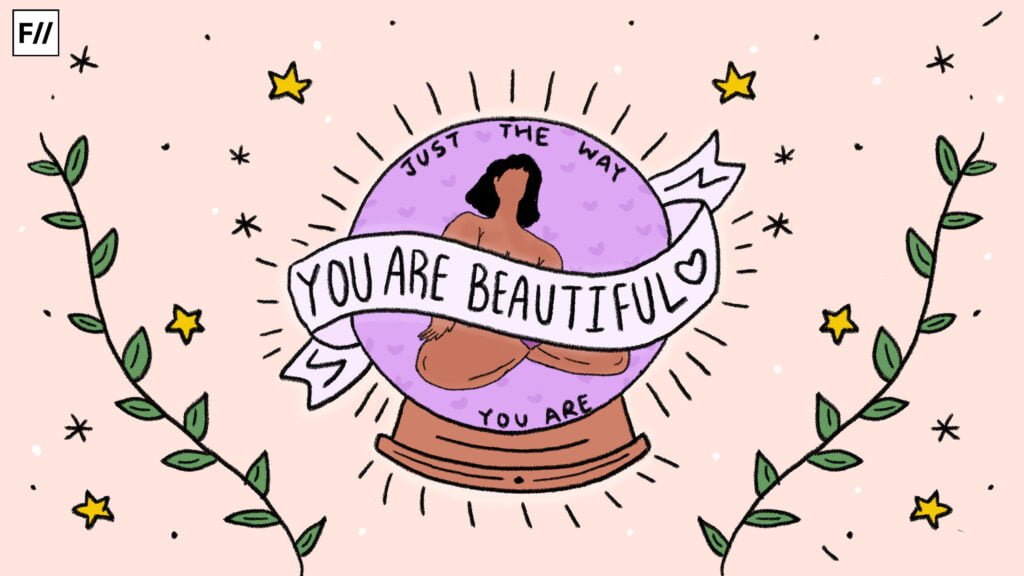
With evolution, obesity has been institutionalised and medicalised. From being a risk factor, it has now been termed a global epidemic by WHO in the year 2000. The radical medicalisation of fatness was largely contributed to by the establishment of the Body Mass Index (BMI) which doesn’t account for social, cultural, racial or biological contribution to a person’s body shape. The BMI is largely confused with socially idealised ‘health weight’, which makes obesity the best example of a socially constructed disease since the status of “sick” does not only come from the BMI but society’s perception of what an ideal weight and body shape is.
Society attributes a moral value to a person’s weight and thinness is now an important social capital to have. Lifestyle choices and the fast-paced world have been attributed to be the primary causes of obesity, but on a more personal level, a person’s deviances have been labelled as the cause of obesity as well.
“Feeling fat”
“It has never really been difficult for me to navigate my experience with my peers, because I am not a fat person objectively, neither am I skinny or lean, I just feel fat,” says D, a 25-year-old Cis-Gendered Woman. The growing trend as a consequence of the socially pragmatic demoralisation of fatness has been the frequent use of the term “feeling fat”.
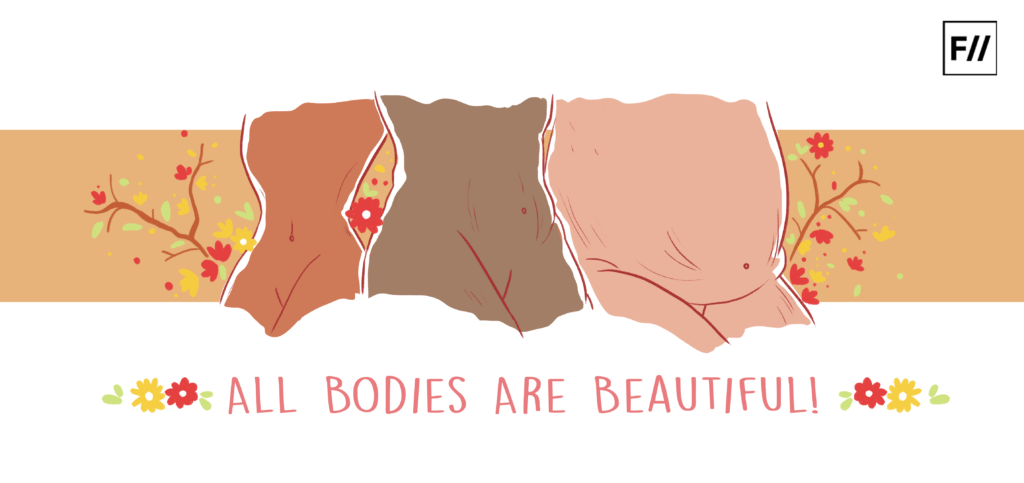
People with smaller bodies often use this term and have the desire to be told by someone that they aren’t a part of the demonic reality which exists for a lot of the demographic, who don’t feel fat, they are indeed ‘just fat’. Fat is often a shorthand for something undesirable and unutterable (almost like That Which Must Not Be Named) and never for anything positive.
We often overhear individuals and especially cis-gendered women using the statement that they “feel fat”. Women of any size, starting from the thinnest person, have used the statement “I look so fat”, at least once in their lifetime. So, where does this come from? Is there a morbid fear in society of actually being fat, or are people just terrified of being perceived as fat? Is being called “fat” the worst fear of someone?
We often overhear individuals and especially cis-gendered women using the statement that they “feel fat”. Women of any size, starting from the thinnest person, have used the statement “I look so fat”, at least once in their lifetime. So, where does this come from? Is there a morbid fear in society of actually being fat, or are people just terrified of being perceived as fat? Is being called “fat” the worst fear of someone?
“My friends and family are mostly supportive but as a fat person, it irks me when my thin friends complain of “feeling fat”. Like they’d hate to be me which exposes the shallowness of their support but in a way, I get their anxieties too. But as if being me (i.e, being fat) is their worst nightmare,” says S, 25-year-old cisgender woman.
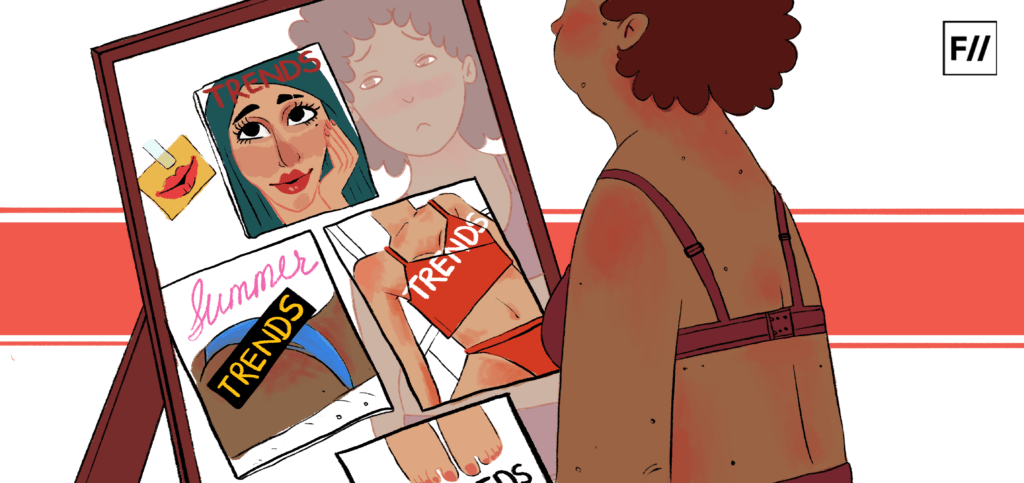
“Fat is a dirty word, yes, when directed to me. I also actively do not use it while talking, subconsciously treating it as a slur,” says D, a 25-year-old cisgender woman.
Thinner people usually do not mean hurt when they use this terminology, it’s usually due to their conditioning. They have been told since they were little kids that being fat is a bad thing. Their bodies are less desirable and society changes their lens while judging them as valid members of the community. A deep fear is instilled in young girls to starve their bodies and to present their bodies in an appropriate size. The socially constructed ideal shape of the body has never been about being fit or healthy, it has always been about fitting into the trendy aesthetic of the climate at that moment. The moral intervention into people’s bodies has also left most of us with a sense of feeling less desirable in sexual relationships.
The shame and stigma
Growing up, many of us are taught to associate being thin with being attractive, successful, and worthy of love and admiration. We’re bombarded with images of thin models and celebrities, and our culture promotes the idea that being overweight is a sign of laziness, lack of self-control, and even moral failure. This messaging can be incredibly damaging, particularly for young people still developing their sense of self-worth and body image. It can lead to a distorted view of food as something to be feared or restricted, rather than something which is to be enjoyed or which is nourishing to the body. We may develop patterns of disordered eating, such as binging, purging, or restrictive eating, as we strive to conform to unrealistic beauty standards.

“I used to feel guilty consuming food in college, not so much now. In college, I remember starving myself on many occasions or treating food as reward. Now, after engaging a nutritionist, that relationship has become healthier, but I still deprive myself of food I crave sometimes when I feel fat,” says D, a 25-year-old cis-gender woman.
Food may become a reward or punishment, rather than a source of sustenance and pleasure. We may feel guilty or ashamed when we indulge in foods deemed “unhealthy” or “fattening,” we may even deny ourselves essential nutrients as we try to maintain a certain weight or body shape. It’s important to remember that food is not the enemy, and we shouldn’t feel ashamed for enjoying certain foods or indulging in treats from time to time. Eating a balanced and varied diet, free from guilt and shame, can help us feel more energised, satisfied, and mentally and physically healthy.
“I do not always struggle with consuming food, but sometimes after a few days when I feel even fuller than usual, like my jeans become more snug at the waist, and my breast tissues pop out from over my bra cup, those are the days I struggle to eat,” says A, 28-year-old cis-gender woman.
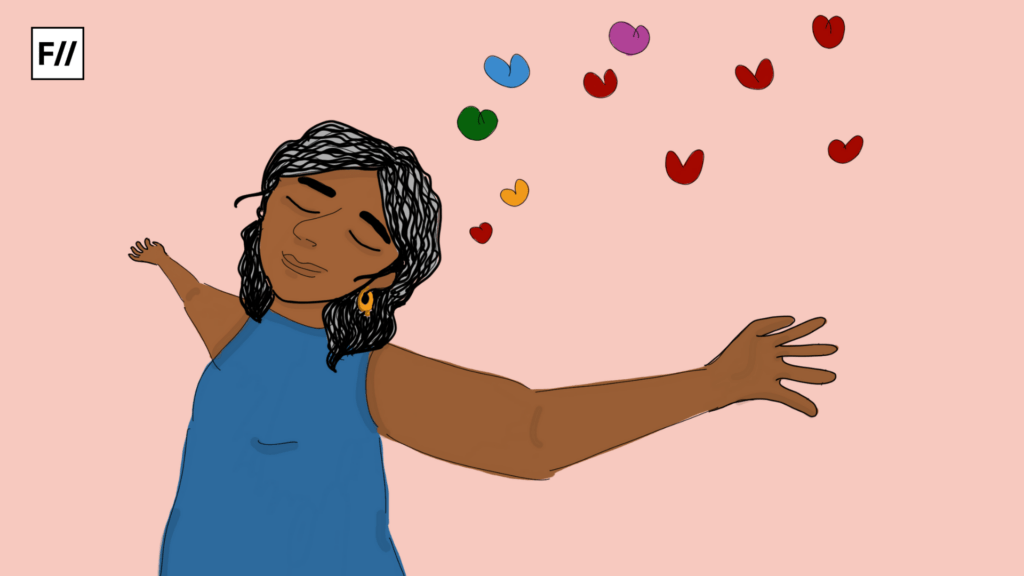
The feeling of deep shame and disgust around fatness is something that is embedded in us since our early days as a child. It is imprinted on us through our parents, our relatives, our peers, our teachers, the movies, the songs and everything that we have seen around us while growing up. Fat shaming, or discriminating against a person for being fat can have grave consequences, starting from bullying from peers or teachers, losing jobs and employment, to threats of violence to actual acts of violence.
“When I was in Class 8, I remember being called fat for the first time. Some of the girls in my class who were also friends at that time and were many sizes smaller than me would check my size on my clothes and laugh about it and call me “moti”. All of this, when in reality I was a UK size 8, and for a 14 year old, who is about 5 foot tall, it’s not so bad! But, back then it was perhaps the first time that my size was explicitly talked about and also made fun of. I felt like I was an odd-one-out amongst my closer peers, I felt “bigger”, and conscious of my body. As part of bullying, my classmates during free periods would close shut the broader panel of the classroom door and challenge people (including) myself to pass through the slim opening of the narrower panel of the door that they had left open. Plus, all of this was in a co-ed school setting where boys were rather immature and would happily partake in making fun of big bodies, especially the females because big breasts would make things more obvious and much worse,” says X, a 28-year-old cis-gendered woman.
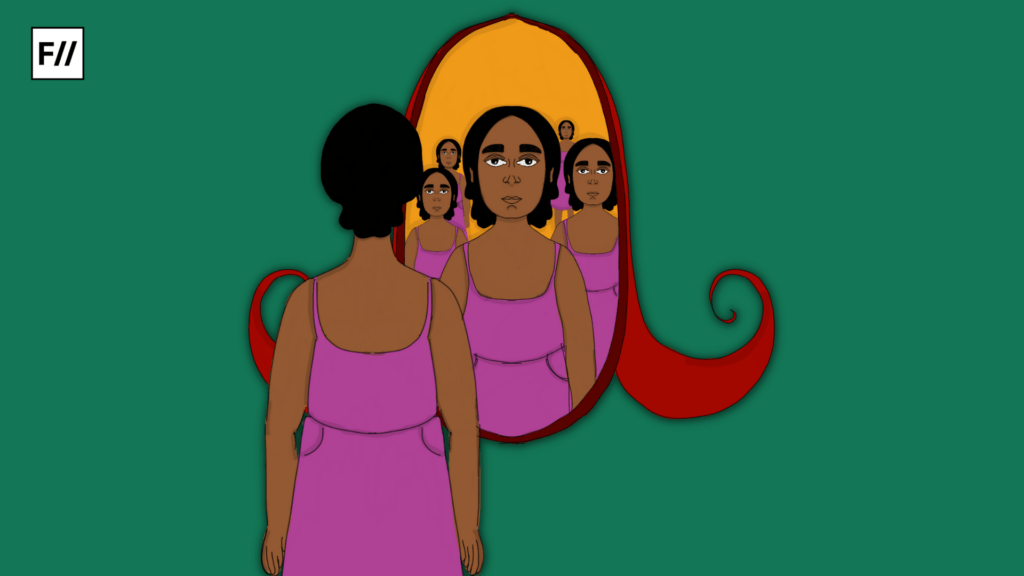
“The first time I was made to “feel” fat was when I was diagnosed with bronchial asthma and due to medication, I gained weight. From that time onwards, I feel that I am fat. My parents and friends started buying different sets of clothes which are more appropriate for my body. It felt kind of smack on my face by the society,” says S, a 26-year-old cis-gender woman.
Fat is NOT a dirty word
“My relationship with that word “fat” has evolved over time. I don’t think it’s dirty anymore,” says Q, a 25-year-old cisgender woman.
The word fat itself is not inherently dirty or negative. However, it can be used as a derogatory term to shame or insult individuals who are perceived as overweight or obese. When used in this way, it reinforces harmful stereotypes and can contribute to body shaming and discrimination. It’s important to recognise that people come in all shapes and sizes, and body weight is not a measure of someone’s worth or value. Ultimately, the way we talk about bodies and weight can have a powerful impact on how people feel about themselves and their bodies. It’s important to be mindful of the language we use and strive to promote body positivity and inclusivity in our conversations.
In the end, the journey towards accepting the word “fat” as a physical description rather than a word loaded with shame and self-disgust, is often a deeply personal journey for individuals, with no contribution whatsoever from media, popular representation, medical world, or even from family or friends.
“I have consciously worked on divorcing a sense of stigma associated with the word and accepted it as a neutral physical descriptor,” says M, a 27-year-old cisgender woman.
In the end, the journey towards accepting the word “fat” as a physical description rather than a word loaded with shame and self-disgust, is often a deeply personal journey for individuals, with no contribution whatsoever from media, popular representation, medical world, or even from family or friends.
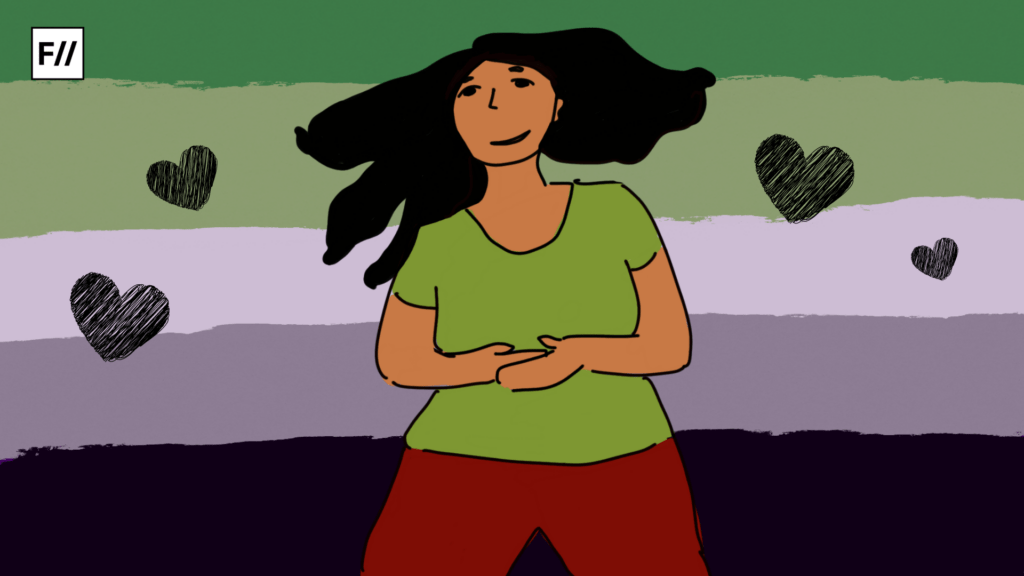
“I used to get very angry. Just because I am visibly fat, people assume I am unhealthy and ask me to exercise. I have never heard anyone telling my thin friends to exercise, because people just assume that just because they are thin, they are healthy. It is not always co-related,” says A, a 25-year-old cisgender woman.
By challenging the harmful attitudes and beliefs that lead to fat shaming and disordered eating, we can learn to embrace a healthier relationship with food and our bodies. This includes promoting body positivity, practising self-compassion, and seeking help from healthcare professionals if we’re struggling with disordered eating behaviours.
Our bodies are different. The way our bodies appear is different. The way our bodies respond to the same food or exercise is different. Fat shaming and body shaming have not helped any individual to move in their personal journeys of health or wellness, it only and solely contributes to diminishing a person’s sense of self.

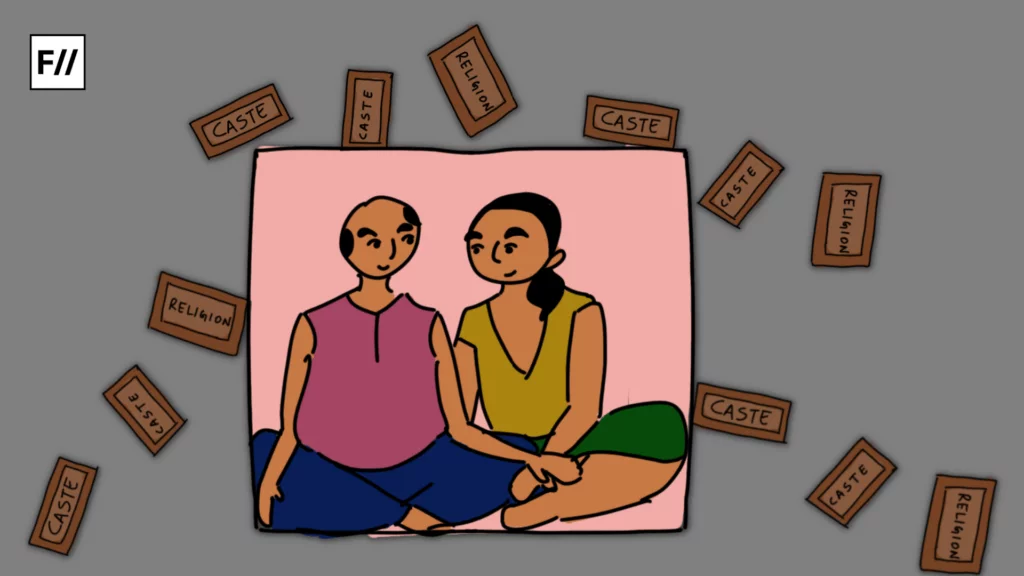



Why add ‘Cis-gender’ before woman ?
What’s the point of it ?
Why add ‘cis-gender’ before woman ?